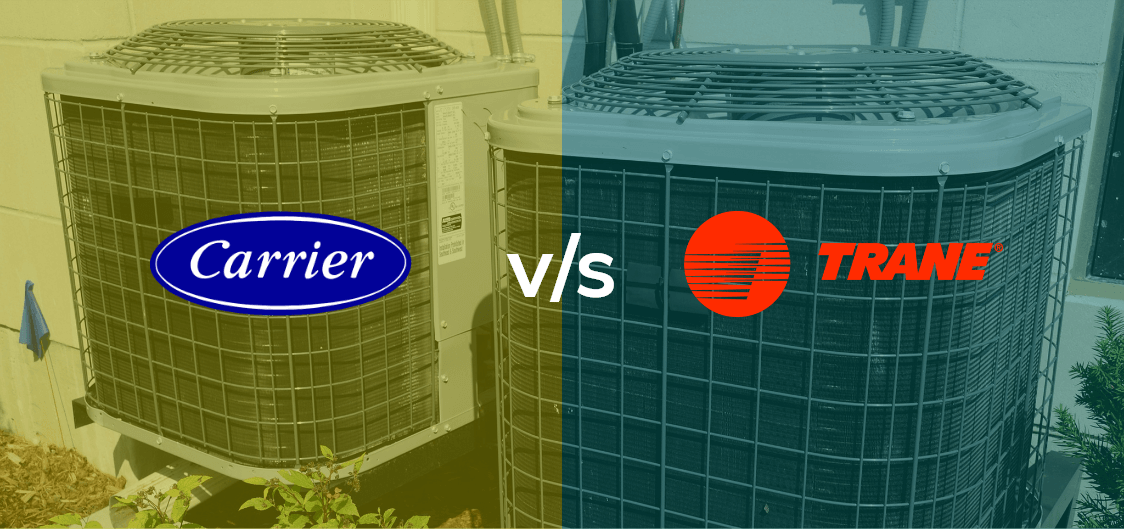Carrier vs. Trane: Which HVAC Brand is Better?
Published Date: February 29, 2024

Carrier and Trane are reputable HVAC manufacturers, and choosing between them should be based on your specific needs and priorities. When deciding, consider aspects like your budget, needed energy efficiency, and desired features. Read more to understand the HVAC brand that would be most suitable for your space.
Carrier vs. Trane At A Glance
Carrier and Trane offer diverse products tailored to meet various heating and cooling requirements. Here’s a glance at both HVAC companies.
Carrier: Company Overview

Carrier, started by Willis Haviland Carrier in 1902, is a major player in air conditioning. They lead the industry, providing heating and cooling solutions for homes and businesses, and have been shaping the field since becoming an independent company again in 2020.
Carrier’s Products
- Air Conditioners:
Carrier's efficient cooling solutions keep homes and businesses comfortably cool. - Furnaces:
Reliable heating systems from Carrier provide warmth and comfort in various settings. - Heat Pumps:
Carrier's dual-function heat pumps offer heating and cooling capabilities for year-round comfort. - Ductless Systems:
Flexible and efficient, Carrier's ductless systems provide targeted heating and cooling without complex ductwork. - Thermostats and Controls:
Carrier's advanced climate control systems empower users with precise temperature management and energy efficiency. - Air Purifiers and Filters:
Enhance indoor air quality with Carrier's solutions, promoting a healthier living environment. - Ventilators:
Carrier's efficient ventilators ensure optimal air circulation for improved indoor air freshness. - Other Products:
Other products include humidifiers, dehumidifiers, Geothermal pumps, Fan coils, boilers, packaged products, and VRF Controls.
Pros
- Carrier systems are made to operate quietly, ensuring a calm interior
- Well-known for reducing energy usage and lowering utility costs over time
- Known for expert craftsmanship
Cons
- It offers only a 10-year warranty and doesn’t include labor or normal wear and tear.
- Require frequent replacements as their coils wear out faster
Trane: Company Overview

Trane is a prominent HVAC company known for its reliable heating, ventilation, and air conditioning (HVAC) systems. They were the first to introduce unit heaters, convection heaters, and AC units with a hermetic compressor. This dedication to innovation continues today, focusing on smart technology integration, energy efficiency, and environmental awareness.
Trane’s Products
- Air conditioners:
Trane designs air conditioning systems for effective cooling in residential and commercial settings. - Furnaces:
Trane provides energy-efficient furnaces with different performance levels and features. - Heat Transfer Pumps:
Energy-efficient heat pumps transfer indoor-outdoor heat, providing both heating and cooling capabilities. - Air Cleaners and Filters:
Trane provides solutions to enhance indoor air quality with air cleaners and filters, promoting a healthier living environment. - Thermostats and Controls:
Trane's advanced climate control systems offer precise temperature management and energy efficiency for optimal comfort. - Humidifiers:
Trane's humidification systems help maintain balanced humidity levels, contributing to overall comfort in indoor spaces. - Ventilation Systems:
Trane's ventilation solutions ensure proper air exchange, improving indoor air freshness and quality. - Air Handlers:
These units collaborate with HVAC systems to circulate conditioned air, ensuring consistent comfort throughout the space. - Other Products:
Some other products include packaged systems, ductless systems, and comfort coils.
Pros
- Uses its own manufactured ‘Climatuff’ compressor for superior performance
- Provides quiet HVAC systems with sound levels as low as 57 dB
- Use R-410A refrigerant, known for its eco-friendly properties
Cons
- Complicated to repair, potentially resulting in higher maintenance costs.
- Trane products are expensive.
Detailed Difference Between Carrier and Trane
Carrier and Trane are two esteemed HVAC (heating, ventilation, and air conditioning) brand names. Although both provide high-quality items, there are significant differences between them:
 Design
Design
Carrier systems frequently have a simplified, contemporary appearance with clear lines. The outside units are often painted a neutral color to complement a variety of home exteriors. While Trane units may appear slightly more intricate than Carrier units, they also feature a modern design.
 Build Quality And Durability
Build Quality And Durability
Carrier is recognized for utilizing premium materials and robust construction, contributing to the longevity of its HVAC systems. Similarly, Trane is renowned for its durability and quality, incorporating high-end components and skilled craftsmanship in its products. Trane systems are reported to last up to 15 to 20 years, although specific information about the durability of Carrier products is not provided.
 Performance
Performance
Both Carrier and Trane strongly emphasize delivering top-notch performance and ensuring customer satisfaction. Carrier offers a variety of options for their furnaces and provides a range of systems with different capacities to suit various space requirements.
On the other hand, Trane offers models suitable for different-sized spaces, ensuring optimal performance and efficiency.
 Reliability
Reliability
Carrier is renowned for its dependable building materials. Their systems are designed to work over an extended period and survive various weather situations. However, systems from Trane are made with quality and longevity in mind. Both brands are well-known and have a reputation for producing reliable heating and cooling systems.
Note: It’s essential to consider factors such as customer reviews, product warranties, and industry ratings to determine the reliability of a specific model.
 Noise Levels
Noise Levels
Carrier air conditioners and heaters are celebrated for their quiet performance, incorporating advanced technologies to reduce noise. Similar to Carrier, Trane systems emphasize silent operation for a peaceful interior atmosphere.
 Energy Efficiency
Energy Efficiency
Carrier systems are renowned for their energy efficiency and frequently meet or surpass industry requirements, resulting in decreased energy usage and lower electricity costs. Carrier systems have SEER ratings ranging from 16 to 24.
On the other hand, Trane HVAC systems are super-efficient, with SEER ratings ranging from 13.4 to 21.5. It maintains a major emphasis on energy-efficient technology, working to produce systems that are not only effective but also ecologically beneficial.
 Installation
Installation
Carrier and Trane HVAC systems, like most heating, ventilation, and air conditioning (HVAC) systems, typically require professional installation and regular maintenance to ensure optimal performance, longevity, and efficiency. Both companies emphasize the importance of professional installation.
Note: It’s advisable to consult with certified HVAC professionals familiar with the specific requirements of the chosen system and follow the installation guidelines.
 Warranty
Warranty
Carrier provides a 10-year warranty on its parts. Additionally, Carrier often offers extended warranty options, allowing consumers to opt for additional coverage beyond the standard warranty period.
On the other hand, Trane offers a 10-year warranty on parts and the coil and a 12-year limited warranty on the compressor. They also present extended warranty options, allowing customers to secure prolonged protection for their HVAC systems.
Note: It is advisable to thoroughly review the warranty terms and conditions provided by each manufacturer and consider any additional coverage options that may be available.
 Maintenance And Repairs
Maintenance And Repairs
Regular maintenance is essential for both Carrier and Trane systems. Carrier has a comprehensive dealer network, making it easier for customers to find authorized repair service providers. When it comes to addressing issues, they emphasize the importance of skilled technicians who are trained to diagnose and fix problems efficiently.
Trane emphasizes skilled technicians, especially through their Trane Comfort Specialist program. Both Carrier and Trane prioritize the use of OEM parts during repairs. These original parts are specifically designed for their respective systems, ensuring compatibility and maintaining the performance and efficiency of the HVAC equipment.
 Features & Capacities
Features & Capacities
Carrier variable-speed AC systems include premium comfort features such as multiple stages for more precise temperature control and more consistent comfort. Their systems offer a diverse range of HVAC systems with different capacities, allowing users to choose a system that suits the size and requirements of their space.
On the other hand, Trane offers functionalities such as ComfortLink Technology, Variable Speed Technology, Quiet Operation, High Efficiency, and more. The system frequently possesses substantial cooling and heating capacities, making it well-suited for various climates.
 Pricing & Financing Options
Pricing & Financing Options
Carrier and Trane provide financing alternatives directly through their websites or approved dealers. Carrier offers financing options with benefits such as convenient monthly payments, competitive interest rates, and online bill payments.
Carrier products come at different costs, with central air conditioners ranging from $3,000 to $15,000, ductless mini splits from $2,000 to $10,500, and geothermal systems priced between $12,000 and $45,000.
On the other hand, Trane’s financing programs offer competitive interest rates, convenient monthly payments, and the flexibility of no prepayment penalties. This ensures a cost-effective and hassle-free financing solution for HVAC system purchases.
Moreover, Trane air conditioners cost ranges from $3,400 – $5,400 for XR14, $10,400 – $16,400 for XR15, and $12,800 – $20,000 for XR17i.
 Customer Support & Reviews
Customer Support & Reviews
Carrier offers robust customer support through channels such as live chat, customer support lines, FAQs, and dedicated HVAC guides. Carrier has an overall positive rating. Customers often appreciate the brand’s responsiveness and assistance, but it’s essential to consider both positive and negative reviews for a balanced perspective.
Trane provides support through various channels, including live chat, customer support lines, FAQs, and specialized HVAC guides. However, Trane has received below-average ratings, notably 1.07/5 on BBB. Many customer reviews highlight concerns about delayed responses from Trane’s support representatives.
 Consumer Reports
Consumer Reports
Carrier and Trane have received praise and excellent ratings in surveys, notably those conducted by customer reports. Trane was the only manufacturer with an “Excellent” rating for dependability and general satisfaction.
In terms of satisfaction, Carrier also scored positive ratings. These evaluations emphasize the satisfied customer experiences with HVAC systems from Carrier and Trane.
 Environmental Sustainability
Environmental Sustainability
Carrier places a strong emphasis on sustainable practices and green technologies. They use a variety of ecologically friendly production techniques and offer a variety of energy-efficient goods.
Trane delivers energy-efficient technology to reduce energy use and carbon emissions and is committed to environmental responsibility. It has adopted the use of R410-A refrigerant, which is widely acknowledged for its safety regarding the ozone and its ability to enhance the efficiency of our systems.
Factors To Consider While Choosing Between Carrier And Trane
Choosing between Carrier and Trane for your HVAC system is extremely important. It should be done after carefully weighing a variety of components to make sure you find the system that best suits your needs.
- Specifications: Consider the size of your house, the environment where you live, and any particular requirements, such as improving the air quality or controlling humidity.
- Budget: Include the costs, installation, and upcoming operational expenses. Various models are available from Carrier and Trane at various pricing points.
- Features: Review the capabilities and features of certain models. Think about variable-speed technology and connectivity with smart thermostats or home automation systems.
- Energy Efficiency: Examine the energy efficiency ratings of Carrier and Trane HVAC models. Select a system that balances the initial cost and long-term energy savings.
- Capacity of System: It is important to determine the capacity of your AC units. The size and capacity of the HVAC system required for your home or commercial space will significantly impact the cost.
- Environmental Impact: Find out whether a brand is committed to sustainability and whether eco-friendly alternatives are offered.
- Consumer Reviews: To learn more about the experience of other people who have installed Carrier and Trane systems, read customer reviews and reports.
- Maintenance: Certain models might need to be maintained more frequently than others to function at their best. Therefore, learn about the maintenance requirements of the system.
- Contact HVAC specialists: They can evaluate your unique demands and provide acceptable model recommendations.
- Warranty Coverage: Consider the duration of coverage, specific components included, and any additional warranty options.
- Local Support and Availability of Parts: Consider the proximity of service providers and the ease of obtaining replacement parts in your area.
- Installation: Consider factors such as the complexity of installation, the need for specialized technicians, and any installation support the manufacturers provide.
- Customer Support: Evaluate the customer support services offered, such as the accessibility of customer service representatives, response times, and the effectiveness of support channels such as phone, email, or online resources.
Which One Is Better, Trane Or Carrier?
Choosing between Trane and Carrier air conditioners ultimately depends on your specific needs. Carrier excels in multiple domains, such as ease of installation and maintenance. Conversely, Trane excels in terms of warranty coverage, SEER ratings, and energy efficiency.
Consider your budget, the climate in which you live, the size of your house, and your long-term energy-saving objectives before making a final choice. Consider consulting an HVAC expert to find the most suitable system to meet your demands.
Frequently Asked Questions (FAQs)
Is Trane And Carrier The Same Company?
No, Trane and Carrier are two separate HVAC companies. These businesses are self-sufficient, each with dealer networks, supply chains, and product lines. They have no link even though they operate in the same industry and offer heating and cooling solutions.
Is Carrier Cheaper Than Trane?
The price of a Carrier or Trane HVAC system can vary significantly depending on several elements, such as the model, size, installation needs, and marketplace. Getting prices from licensed dealers for specific Carrier and Trane models that fit your needs is beneficial.
Does Trane Or Carrier Last Longer?
When maintained, both Trane and Carrier HVAC systems have delivered reliable services for many years. Many customers claim that Trane systems often last longer than those from certain other companies.
Is Trane Better Than Carrier?
Trane and Carrier are recognized companies entirely devoted to providing high-quality cooling solutions, so you should decide based on what is most important to you and your family. However, a thorough examination of the features reveals that Trane air conditioners stand out as a superior option in numerous important categories.
Is Carrier Furnace Better Than Trane?
Trane and Carrier are well known for their premium, two-stage gas furnaces. Gas furnaces from both companies often have similar AFUE efficiency ratings, demonstrating their great efficiency in turning fuel into heat. These ratings indicate little energy waste.
Do Carrier And Trane Offer Smart HVAC Technology?
Carrier and Trane understand the significance of smart technology in contemporary households, and their smart HVAC solutions are designed to accommodate various preferences and requirements. These advanced technologies provide convenience and also help to improve energy efficiency, which in turn may bring about long-term financial gains.




